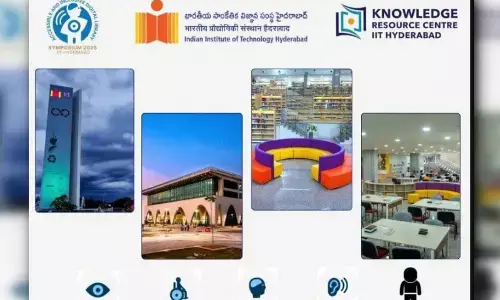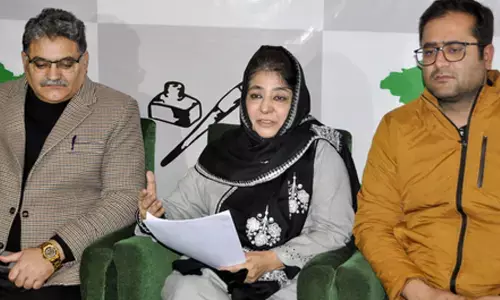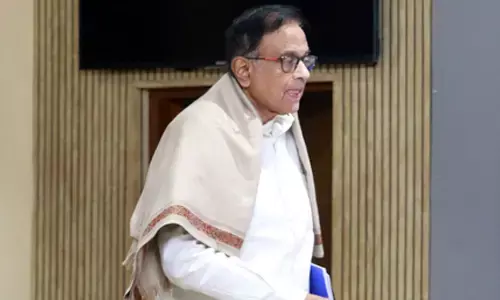Suravaram: A great man of letters

Telangana is in the process of rediscovering the men and women who brought it glory and talked about its greatness. An attempt to reconstruct the entire history of Telangana is being done with more passion than ever before.
Telangana is in the process of rediscovering the men and women who brought it glory and talked about its greatness. An attempt to reconstruct the entire history of Telangana is being done with more passion than ever before. In this process, Suravaram Prathapareddy’s contribution to the history, politics, culture, literature, language and journalism of Telugu people should be recorded in a befitting manner because all these days the luminaries of Telangana were ignored by the colonial Andhra scholars as well as hegemonic rulers.
Not only Prathapareddy but also many versatile personalities of the 20th century were either ignored or given little prominence. Now the Telangana dream has come true. It is time to record the role of all these people in the renaissance of this part of India. To begin with Suravaram is only appropriate. Prathapareddy can be described as a bridge between the new and the old generations and was known for his fusion of tradition and modernity. He literally led from the front in building the Andhra Mahasabha which paved way for enlightening the Telangana masses in all spheres.
Under his able presidentship, the first Andhra Mahasabha meeting was held in 1930 at Jogipet now in Sangareddy district in Telangana State. He was instrumental in bringing all walks of the people into the fold of Andhra Mahasabha. Dalit leaders like Bhagyreddyvarma, Arige Ramaswamy and Janupala Raghuram of the barbers community, Mitta Laxminarsayya of Munnurkapu community, Hakim Narayan das and Hakim Janardhan das of the weavers community participated actively in the Andhra Mahasabha activities mainly because of Suravaram.
There was a skirmish at Jogipet where the first Andhra Mahasabha meeting was held. Dalit leader Bhagyareddyvarma was invited onto the dais to address the gathering but some of the upper caste representatives like Bachu Venkateshamgupta of Sadashivapet objected to his very presence. But Suravaram convinced all the agitators, saying everyone should be united in fighting the government oppression, and its anti-people’s policies or else the Nizam government would bulldoze everyone’s rights.
He also said caste discrimination would weaken the society and therefore these barriers should be overcome. He strongly supported inter-caste dining. He took initiation in organizing inter caste dining involving Dalits and Kayasths in the early 1930s. To promote education among the Backward Castes, he encouraged them to start their own community hostels. Padmashali, Munnurukapu, Gouda hostels got the support of Suravaram in establishing them. He involved the leaders of these communities in Andhra Mahasabha.
Apart from the Andhra Mahasabha, Suravaram played a key role in the library movement in the entire Telugu speaking area. He took pains to organise state-level library meetings at Madhira in Khammam district in 1925 and later at Kyathuru in Mahabunagar district. These meetings played a key role in spreading awareness of libraries among rural masses. Inspired by the Suravaram’s preaching, many enthusiasts started libraries in their villages. These libraries subscribed to ‘Golconda’ bi-weekly, which was edited by Suravaram Prathapareddy. The combined effort of Library Movement and ‘Golconda’ newspaper increased numbers of Telugu readers in remote places too.
To cater the needs of new and emerging Telugu readers, Suravaram wrote an encyclopedic work ‘Yuvajanavignanam’. In this book, he included information that can be used by adult literates. Apart from this, Suravaram wrote a number of short stories, editorials, essays and forewords. Criticism on Ramayanam made him an acclaimed scholar. His magnum opus work, ‘Andhrulasanghikacharitra,’ (History of Andhras) earned him the Kendra Sahitya Academy award posthumously in 1955. In fact, he was the first person to have got the Kendra Sahitya Academy award in Telugu language.
Suravaram’s short stories depicted the lives of the oppressed. Life in Hyderabad was painted in words. ‘Hussein bee’ is the story of a converted Muslim woman. Hussein bee was a Brahmin widowed woman who faced hardships from her family and relatives. Her story was penned by Suravaram. In another story ‘Sanghalapantulu’ (The man of organisations), he pictured Telangana on the eve of armed struggle, and making people aware of their woes.
Apart from these stories, he depicted life under Muslim rule in the ‘Moghalayikathalu.’ Not only a story writer, he was an acclaimed poet and novelist. Unfortunately, all his novels were unpublished and went into oblivion. His poetry also had a long-lasting value. I had an opportunity to edit his poems. These poems were published under the title, ‘Suravaram Kavitvam’ in 2011. His poems are on different subjects. Poetry against untouchability, communal harmony and a long poem on Gazhnavi earned him name and fame as the great poet in academic and literary circles.
At the height of Telangana Movement in 2012, Sunkireddy Narayanareddy and I edited his articles on Telangana under the title, ‘Suravaram Prathapareddy Telanganavyasaalu.’ Suravaram was a hardcore Telanganite. In reply to an Andhra scholar Mudumbai Raghavacharyulu’s criticism that there was no poet in Telangana, he brought out a 354 poets anthology under the tittle ‘Golconda Kavulasanchika,’ which also included the poetry of Dalit ArigeRamaswamy. This is first of its kind in Telugu literary history. He unfurled the flag of self-respect with this Sanchika. For this compilation, he strongly criticised Andhra scholars for their pre-conceived notions, and partisan and negative attitude towards the Telangana people, culture, language and literature.
Prathapareddy was a scholar in Telugu, English, Urdu and Sanskrit. He learnt Sanskrit under the guidance of famous scholar Vedam Venkataraya Shastry at Madras while he was pursuing his FA course. To learn Sanskrit, he gave up eating meat for life. This shows the grit of Suravaram. Apart from Telugu, he wrote in English and Urdu as well. He was a source of inspiration to the young brigade like Nandagiri Venkatarao in the field of literature.
Suravaram was the founder editor of ‘Golconda’ bi-weekly, and served the paper for more than 25 years. The paper was started on May 10 in 1926. As the editor of this paper, he never compromised on values and morals, minced no words in criticising the very founders of the paper at times. He was in trouble for writing critical editorials on the Nizam as well as Deshmukhs and Jamindars. In fact, the paper was funded by Deshmukhs, Jagirdars and Jamindars. He never hesitated in criticising the high-handedness of the landlords and doras.
Suravaram also played a pivotal role in establishing schools and organisations. He established ‘Andhra Vidyalaya’ so that Hindus could opt for Telugu medium education when Urdu was ruling the roost. He also played a key role in shaping the Reddy Hostel in early 1920s. Under his guidance, eminent Communist leaders like Ravi Narayanareddy, Arutla Ramachandrareddy emerged as great leaders. His Golconda Patrika office was the meeting point for all the literary persons and intellectuals. Serious discussions on a wide range of subjects were held at the Golconda Darbar, in which Madapati Hanumantharao, Burgula Ramakrishna Rao, Tallavazzala Shivashankarashastry and many more people used to participate.
He himself wrote a number of articles under so many pseudonyms. He encouraged women to write extensively, and due to this, Yellapragada Sitakumari, Sangem Laxmibayamma, Illindala Saraswatidevi wrote on different issues. Through the Golconda bi-weekly (which later became a daily in 1948) Suravaram ran a movement to start Andhra Vidyalaya. Due to his efforts, the famous Andhra Vidyalaya came in to existence.
Suravaram also established an organization called ‘Vignanavardhiniparishath.’ The parishath published a number of books and organized many meetings on literature and science. This inculcated scientific temper among Telugu scholars of that time, like Khandavalli Balendu Shekaram. Suravaram also established and edited a daily paper called ‘Prajavani’ in 1951, but it did not sustain for a long period, due to financial reasons and the publication of the paper was shut down within a year.
Suravaram was elected to the Hyderabad Assembly on the Congress ticket from Wanaparthy in the then Mahabubnagar district. He was tipped as future education minister of Hyderabad state but unfortunately the political feud between Reddy and Brahmin leaders deprived him of the opportunity. Prathapareddy born in an affluent family in 1896 on May 28 at IItikyalapadu in Mahabubnagar district. Because of his paternal uncle Ramakrishna Reddy’s encouragement, he studied at Madras. Later with support of Kotwal Venkataramareddy he entered social movements, where he made his mark. He died penniless in 1953 on August 25.
Telangana state should take measures to publish ‘Suravaram’s complete works’ on a priority basis. In this regard, Telugu Academy made some effort, but it was stopped for reasons unknown. Now on the occasion of his 64th death anniversary, the government should look into the matter. It is also a demand of all the Telanganites that the Potti Sriramulu Telugu University be named as “Suravaram Pratapareddy Telugu University.’ Hope the Telangana government acts on these suggestions. This will be a real tribute the legendary editor, activist and man of letters. (Writer is an Assistant Professor at Telugu University, Hyderabad)
By Sangishetty Srinivas










